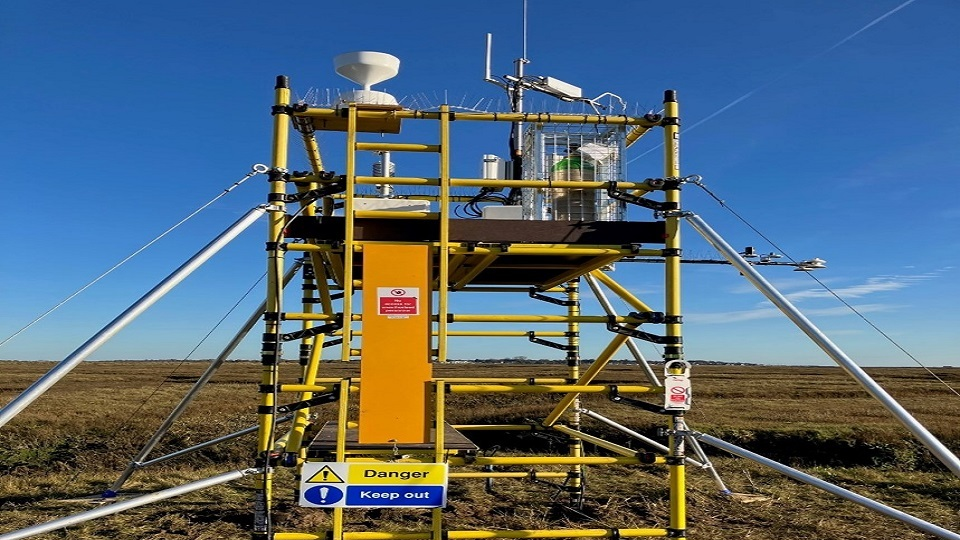The Environment Agency will be monitoring an Essex saltmarsh as part of a new UK-wide research project. The new project has seen the installation of a flux tower on a saltmarsh at Abbotts Hall in the Blackwater Estuary in Essex in partnership with the Essex Wildlife Trust.
The EA has worked in partnership with the UK Centre for Ecology & Hydrology (UKCEH) to purchase and install four flux towers on saltmarshes across England. This has been funded by the Defra marine Natural Capital and Ecosystem Assessment (mNCEA) programme.
Saltmarshes are important ecosystems that provide many valuable services, including habitat for a wide range of creatures. They also act as natural flood defences and help to capture CO2 from the atmosphere to store it in sediments. It is estimated that 85% of UK saltmarsh has been lost since the mid-19th Century.
However, although we know these ecosystems are valuable, there is a lack of data on how saltmarshes capture and store carbon. The tower at Abbotts Hall is providing long-term, real-time, data that can help our understanding of how saltmarshes function as carbon sinks now and in the future. Similar towers have previously been used on other types of habitats such as forests and peat bogs. Networks of these towers have provided vital data which has helped to encourage restoration and investment in these ecosystems.
The Environment Agency and UKCEH scientists, in partnership with the RSPB, have installed another two towers in Lincolnshire. A further tower will be added in the future. Additionally, two other towers were installed last year in the Ribble Estuary by Natural England and WWF. In total, these six towers will provide the first in depth look into greenhouse gas storage and emissions in saltmarshes in England. Once the value of these ecosystems has been quantified, we hope this will lead to increased conservation and restoration of saltmarshes.
Dr Ben Green, Senior Advisor in Estuaries and Coasts Planning, for the Environment Agency said:
“These flux towers will improve our understanding of the ability of saltmarsh habitats to sequester carbon across tides, days, seasons and years. The evidence they will provide will be key to support the further restoration of saltmarshes, and for the inclusion of these habitats on the UK Greenhouse Gas Inventory”.
Dr Ross Morrison, Biometeorologist at UKCEH, added:
“Thanks to our new network of coastal flux towers, we’ll provide the first directly measured carbon budgets for a range of different saltmarsh systems across the country by the end of this year, improving our knowledge on how they might help us transition towards our net zero goals. Equally, the flux towers will help us understand how the processes in coastal environments function today, and how things may change into the future.”
UKCEH is leading a consortium across charity, finance and academic sectors to develop and pilot a UK Saltmarsh Carbon Code. This rigorous and scientifically-based voluntary certification standard will enable saltmarsh carbon to be confidently purchased, thus providing an income stream for restoration projects and supporting the achievement of national Net Zero goals.
Rachel Langley, Head of Marine and Coastal Recovery for Essex Wildlife Trust, said:
“Saltmarshes epitomise the Essex coast and support a huge range of wildlife from tiny insects to fish in the creeks and birds roosting and feeding on the marsh. They also support our coastal communities by acting as natural flood defences, and capture and store CO2. The historic loss of saltmarshes and the current degraded state of many highlights the urgency of recovering these important and iconic habitats. Essex Wildlife Trust is pleased to work in partnership with the Environment Agency to fill key evidence gaps to support the further restoration of saltmarshes.”



